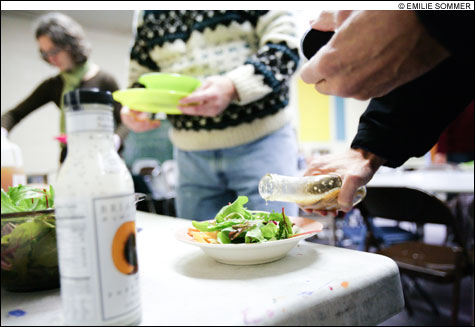
FEEDING THEMSELVES PFC organizers break bread before talking turkey. |
“It’s a crime, really, that the largest city in Maine doesn’t have a natural foods co-op,” says Scott Cooper, co-manager of the Rising Tide Community Market in Damariscotta. Indeed, it is counterintuitive that our liberal city isn’t home to a food cooperative, in which community members, not outside shareholders, hold the ownership and decision-making power. The lefty enclaves of Cambridge, Burlington, and Northampton all harbor successful food co-ops — why not us?
It wasn’t always like this. Portland’s Good Day Market and Cooperative first had its home through the 1970s and ‘80s on Brackett Street in the West End, and then moved in 1995 to 59 Middle Street — between India Street and Franklin Arterial. The all-vegetarian neighborhood food co-op, whose sales peaked at more than $1 million in its best year, folded in 1997 amidst financial woes.
“We couldn’t keep the shelves stocked after a while,” recalls Dan Gillotte, who worked as Good Day’s produce manager until it closed, then moved to Austin, Texas, where he currently serves as general manager of the successful Wheatsville co-op. “The debt burden was higher than we could handle ... You can’t do a project like that on a shoestring.”
In retrospect, Gillotte hypothesizes that the vegetarian principles may have been part of the turn-off to some potential shoppers. “Being more dogmatic than practical was a problem,” he says. “We isolated ourselves in a way that didn’t allow us to be as inclusive as we could have been.”
For a while, Portland’s local, natural-food enthusiasts were well-served by the Whole Grocer on Marginal Way. Then the shining megalith that is Whole Foods bought out Whole Grocer in 2005; the store closed in 2006 when a 48,000-square-foot Whole Foods opened on Somerset Street in February of this year.
It was at this point that a group of local-food enthusiasts started tossing around the idea of reviving a food co-op here — and so the Portland Food Cooperative (PFC) was born in April 2006. “The people who had been shopping at the Whole Grocer for years, supporting that local business on a regular basis, were frustrated by a lack of a viable, local option for buying groceries,” the group’s summer 2007 progress report says of its history.
For about a year and half, a core group of about 10 people has gathered at bi-weekly pot-luck dinners-cum-organizational meetings, taking slooooooow steps toward turning that frustration into a viable business that balances principle with profit.
Philosophical roadblocks
At its core, the cooperative is a business that is member-owned — as opposed to being owned by outside, often corporate, shareholders. Surplus revenues (money earned on top of operating expenses and investments) are returned to members, in proportion to their use of the cooperative; for example, in a food co-op, surplus revenue would be returned to individual members depending on how much food and other goods they bought at the co-op that year.
In theory, this system of ownership is empowering, because it affords members both quality and price control over members’ own goods and services. According to the National Cooperative Business Association, four in 10 Americans are served by co-ops today, which range in business purpose from banking associations to telecommunications to retail to childcare.
The country’s vigorous focus on environmental issues has turned more people’s attention toward food — natural food, organic food, local food, free-range food — and Stuart Reid, development specialist of the Food Co-op 500 Program, a fledgling organization that helps start-up food co-ops, thinks the atmosphere is a good one in which to launch a food cooperative. There are slightly fewer than 300 food co-ops in the United States right now; Food Co-op 500 hopes to raise that number to 500 “in the foreseeable future,” Reid says. “The awareness of food issues right now is so high.”
Combine that heightened awareness with collective distrust of large corporations, and Portland’s Buy Local fever, and the absence of a food co-op does seem glaring.
“We’ve recognized a void — it’s yet to be determined whether it’s a collective need,” says Sarah Miller, 34, a Goddard College graduate student and one of the core members of the PFC planning group. What Miller and her collaborators mean is that while the absence of local, natural shopping options in Portland is obvious, they’ve yet to determine the extent to which the community wants such options — and in what manifestation.
In fact, much about Portland’s potential co-op remains unknown, including where it will be located (the group is investigating the space currently occupied by Wild Oats, but that’s largely a pipe dream), and just how local this “buy local” organization will be — for example, if broccoli doesn’t grow in Maine during the winter, will co-op shoppers be forced to go without it for the duration of the colder months? Should that be the case, Portlanders wouldn’t go hungry — there are always root-cellar-able fruits and veggies like potatoes or apples, and preservable ones, like tomatoes or zucchini (broccoli, for that matter, could be sold in a preserved form, frozen or canned). But it would certainly be an interesting business model, one that values principle (i.e., seasonal eating) over proven sales tactics (i.e., giving the customer what they want, when they want it).